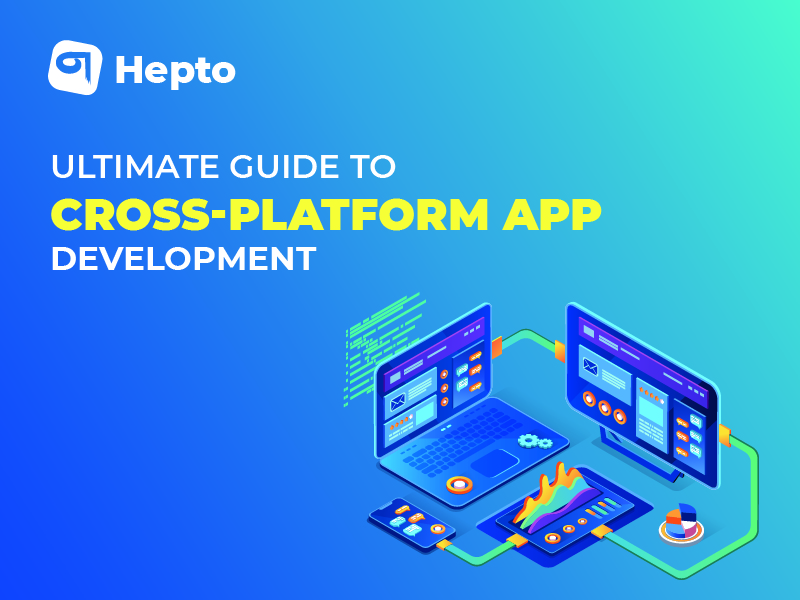Things Everyone Needs To Know About Cross-Platform App Development
Most entrepreneurs have to switch their businesses to mobile devices in this digital world to reach more target audiences. In today’s highly disruptive mobile app development world, businesses would not risk missing their online presence on either platform Google Play Store or the Apple App Store. It is essential that the business mobile applications seamlessly run on multiple platforms such as iOS, Android and Windows. However, budgeting is usually an issue for native app development so why cross-platform app development has emerged as the unrivalled choice of businesses that aim for a presence on both Android and iOS. In this blog, let’s talk about cross-platform app development, the pros and cons of cross-platform app development and discuss the top frameworks use to build multiplatform solutions.
What is Cross-Platform App Development?
Cross-Platform mobile app development aims at developing a single application written in a single programming language that runs identically on several platforms. Cross-Platform app development is the practice of developing software services for multiple platforms that allow your product to run on multiple mobile operating systems. When the code for a mobile app is ready, it is compatible with any operating system and works seamlessly on both iOS and Android. Cross-Platform App development has a rapid development, and turnaround time and is cost-effective and is compatible with various mobile operating systems, so it reaches a wider audience.
What makes Cross-Platform app development different from other app development?
We learned what cross-platform mobile development is, but there are distinctions to be aware of in Native and Multi-Platform App development. For further clarification, let's consider the difference between native app creation and cross-platform apps and hybrid. Native Mobile Applications are built using the tools and SDKs offered by platform owners like Apple and Google. Cross-Platform Native Mobile Applications can be written in various programming languages and then compiled for each platform separately. Hybrid Mobile Applications are built using the latest web technologies and then bundled as mobile applications for the required platforms. Progressive Web Applications are basically web applications that also run on mobile and don’t require native or cross-platform development.
Best Tools for Cross-Platform Mobile Apps:
Xamarin
Xamarin is a leading free, popular open-source cross-platform mobile app framework that relies on the C# programming language complemented with the .NET framework that uses C# or Ruby for coding to build hybrid mobile apps. The Xamarin solutions are compatible with any mobile platform and provide the same performance and user experience as native solutions.
React Native
React Native is one of the top cross-platform mobile development frameworks, using JavaScript, Java, Swift, or C languages specific for native platforms to build cross-platform solutions. React Native is a top cross-platform mobile development framework and a best-in-class JavaScript library for creating user interfaces and converting the source code into native elements, contributing to the native user experience.
PhoneGap
Backed by Adobe, PhoneGap is the best open-source mobile application development framework that allows apps to be written in HTML5, CSS3, and JavaScript for hybrid solutions. Phone Gap allows for faster app development cycles and provides native plugins and containers for each mobile platform to create more features and access device functionality such as a microphone, camera, etc.
Ionic
Ionic has a rich set of features and tools and it is open-source, easily maintained, scalable, and is definitely among the best hybrid app frameworks. Ionic provides its customers with regular updates and resources from the development community. The applications based on Ionic possess native functionalities, specific gestures, and customizable tools that enhance user-friendliness.
Pros of Cross-Platform Apps
Rapid Development - a single cycle of development is needed to create an app that runs on multiple platforms.
Great Product Maintenance - it is easier to maintain and deploy code as changes are made.
Target Audience - by building a single app, one can target both iOS and Android platforms and maximize the reach.
Reduced Cost - reusable codes, and tools make the app development processes lesser.
Code Reusability - instead of developing new codes for every platform, a single code can be reused.
Cons of Cross-Platform Apps
Limited Functionality - may have difficulty navigating smartphone capabilities than a native app.
Slower App - the app is slower than its native counterpart due to an additional abstract layer and rendering process.
Difficult Integrations - it is challenging to integrate cross-platform apps into local settings
Bottom Line
Cross-platform apps are popular as it eliminates the effort to develop different apps for different platforms and can run across devices and platforms seamlessly. To develop a universally compatible mobile app for your business, a cross-platform framework is essential. Hepto Technologies is the best cross-platform mobile app development company has a team of highly equipped UI/UX designers and developers having experience in the cross-platform app domain developing scalable and prominent solutions in React Native, iOS, and Android (Native & Hybrid platforms) of different complexities. We serve the best cross-platform app development services as per business needs and strive forward to empower your business through our optimization efforts. We produce something innovative and unique that makes your business and services stand apart from the ever-changing competition.
